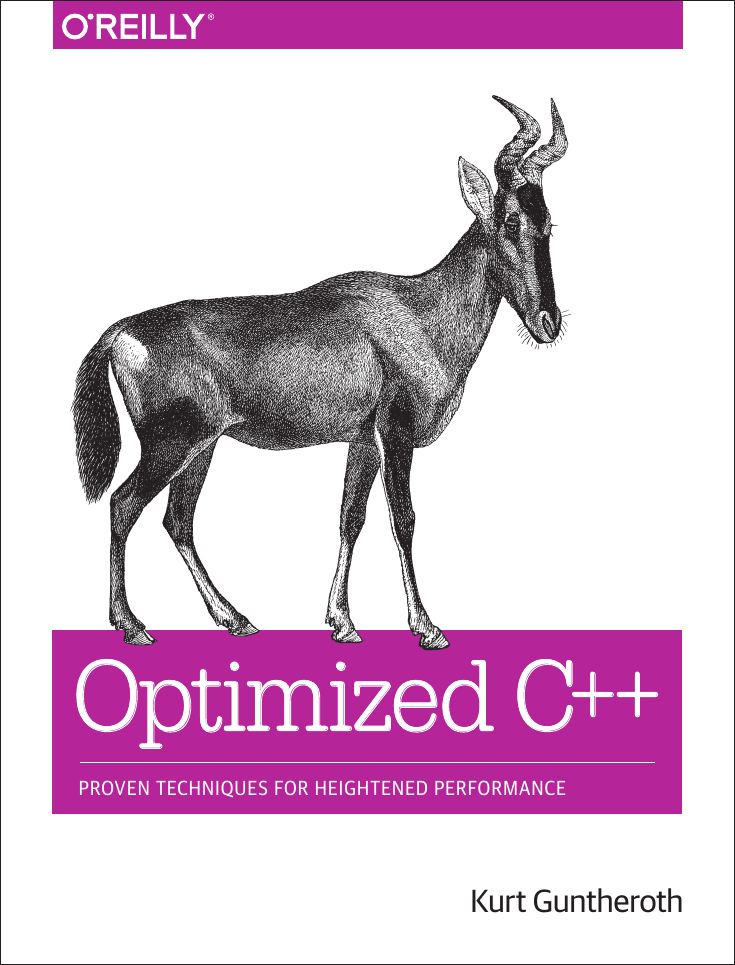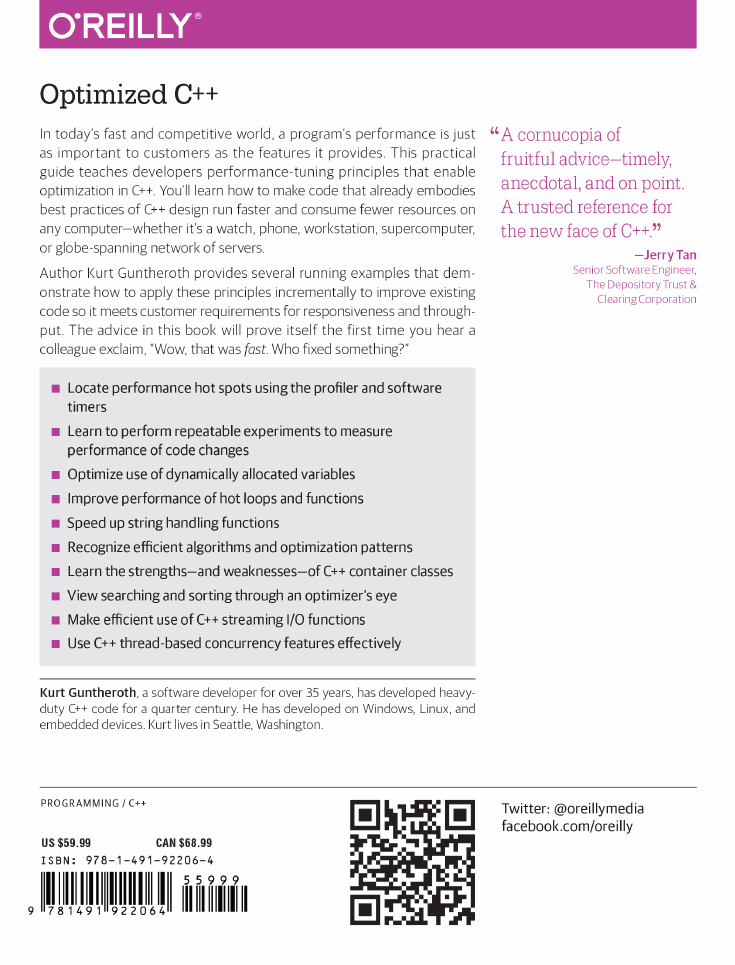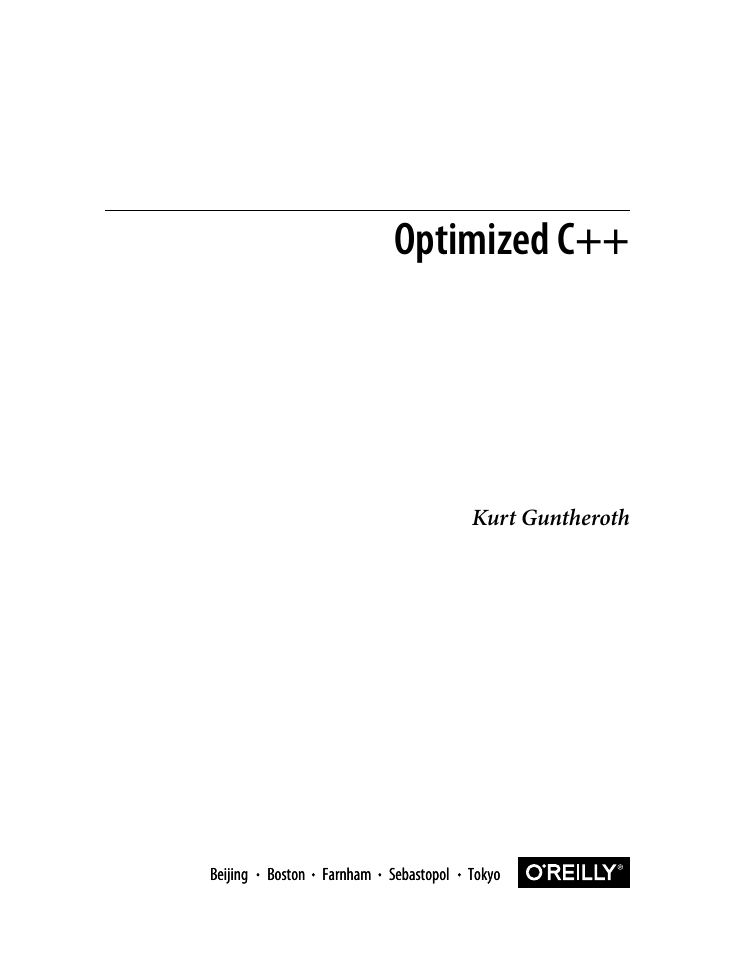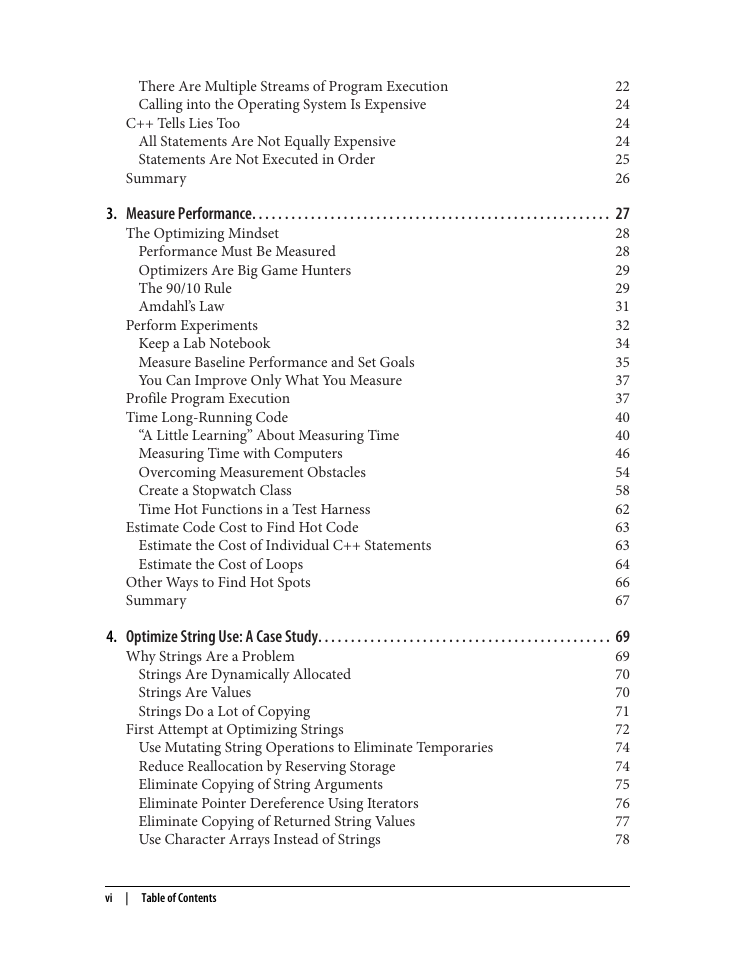Copyright
Table of Contents
Preface
Apology for the Code in This Book
Using Code Examples
Conventions Used in This Book
Chapter 1. An Overview of Optimization
Optimization Is Part of Software Development
Optimization Is Effective
It’s OK to Optimize
A Nanosecond Here, a Nanosecond There
Summary of Strategies for Optimizing C++ Code
Use a Better Compiler, Use Your Compiler Better
Use Better Algorithms
Use Better Libraries
Reduce Memory Allocation and Copying
Remove Computation
Use Better Data Structures
Increase Concurrency
Optimize Memory Management
Summary
Chapter 2. Computer Behavior Affecting Optimization
Lies C++ Believes About Computers
The Truth About Computers
Memory Is Slow
Memory Is Not Accessed in Bytes
Some Memory Accesses Are Slower than Others
Memory Words Have a Big End and a Little End
Memory Has Finite Capacity
Instruction Execution Is Slow
Making Decisions Is Hard for Computers
There Are Multiple Streams of Program Execution
Calling into the Operating System Is Expensive
C++ Tells Lies Too
All Statements Are Not Equally Expensive
Statements Are Not Executed in Order
Summary
Chapter 3. Measure Performance
The Optimizing Mindset
Performance Must Be Measured
Optimizers Are Big Game Hunters
The 90/10 Rule
Amdahl’s Law
Perform Experiments
Keep a Lab Notebook
Measure Baseline Performance and Set Goals
You Can Improve Only What You Measure
Profile Program Execution
Time Long-Running Code
“A Little Learning” About Measuring Time
Measuring Time with Computers
Overcoming Measurement Obstacles
Create a Stopwatch Class
Time Hot Functions in a Test Harness
Estimate Code Cost to Find Hot Code
Estimate the Cost of Individual C++ Statements
Estimate the Cost of Loops
Other Ways to Find Hot Spots
Summary
Chapter 4. Optimize String Use: A Case Study
Why Strings Are a Problem
Strings Are Dynamically Allocated
Strings Are Values
Strings Do a Lot of Copying
First Attempt at Optimizing Strings
Use Mutating String Operations to Eliminate Temporaries
Reduce Reallocation by Reserving Storage
Eliminate Copying of String Arguments
Eliminate Pointer Dereference Using Iterators
Eliminate Copying of Returned String Values
Use Character Arrays Instead of Strings
Summary of First Optimization Attempt
Second Attempt at Optimizing Strings
Use a Better Algorithm
Use a Better Compiler
Use a Better String Library
Use a Better Allocator
Eliminate String Conversion
Conversion from C String to std::string
Converting Between Character Encodings
Summary
Chapter 5. Optimize Algorithms
Time Cost of Algorithms
Best-Case, Average, and Worst-Case Time Cost
Amortized Time Cost
Other Costs
Toolkit to Optimize Searching and Sorting
Efficient Search Algorithms
Time Cost of Searching Algorithms
All Searches Are Equal When n Is Small
Efficient Sort Algorithms
Time Cost of Sorting Algorithms
Replace Sorts Having Poor Worst-Case Performance
Exploit Known Properties of the Input Data
Optimization Patterns
Precomputation
Lazy Computation
Batching
Caching
Specialization
Taking Bigger Bites
Hinting
Optimizing the Expected Path
Hashing
Double-Checking
Summary
Chapter 6. Optimize Dynamically Allocated Variables
C++ Variables Refresher
Storage Duration of Variables
Ownership of Variables
Value Objects and Entity Objects
C++ Dynamic Variable API Refresher
Smart Pointers Automate Ownership of Dynamic Variables
Dynamic Variables Have Runtime Cost
Reduce Use of Dynamic Variables
Create Class Instances Statically
Use Static Data Structures
Use std::make_shared Instead of new
Don’t Share Ownership Unnecessarily
Use a “Master Pointer” to Own Dynamic Variables
Reduce Reallocation of Dynamic Variables
Preallocate Dynamic Variables to Prevent Reallocation
Create Dynamic Variables Outside of Loops
Eliminate Unneeded Copying
Disable Unwanted Copying in the Class Definition
Eliminate Copying on Function Call
Eliminate Copying on Function Return
Copy Free Libraries
Implement the “Copy on Write” Idiom
Slice Data Structures
Implement Move Semantics
Nonstandard Copy Semantics: A Painful Hack
std::swap(): The Poor Man’s Move Semantics
Shared Ownership of Entities
The Moving Parts of Move Semantics
Update Code to Use Move Semantics
Subtleties of Move Semantics
Flatten Data Structures
Summary
Chapter 7. Optimize Hot Statements
Remove Code from Loops
Cache the Loop End Value
Use More Efficient Loop Statements
Count Down Instead of Up
Remove Invariant Code from Loops
Remove Unneeded Function Calls from Loops
Remove Hidden Function Calls from Loops
Remove Expensive, Slow-Changing Calls from Loops
Push Loops Down into Functions to Reduce Call Overhead
Do Some Actions Less Frequently
What About Everything Else?
Remove Code from Functions
Cost of Function Calls
Declare Brief Functions Inline
Define Functions Before First Use
Eliminate Unused Polymorphism
Discard Unused Interfaces
Select Implementation at Compile Time with Templates
Eliminate Uses of the PIMPL Idiom
Eliminate Calls into DLLs
Use Static Member Functions Instead of Member Functions
Move Virtual Destructor to Base Class
Optimize Expressions
Simplify Expressions
Group Constants Together
Use Less-Expensive Operators
Use Integer Arithmetic Instead of Floating Arithmetic
Double May Be Faster than Float
Replace Iterative Computations with Closed Forms
Optimize Control Flow Idioms
Use switch Instead of if-elseif-else
Use Virtual Functions Instead of switch or if
Use No-Cost Exception Handling
Summary
Chapter 8. Use Better Libraries
Optimize Standard Library Use
Philosophy of the C++ Standard Library
Issues in Use of the C++ Standard Library
Optimize Existing Libraries
Change as Little as Possible
Add Functions Rather than Change Functionality
Design Optimized Libraries
Code in Haste, Repent at Leisure
Parsimony Is a Virtue in Library Design
Make Memory Allocation Decisions Outside the Library
When in Doubt, Code Libraries for Speed
Functions Are Easier to Optimize than Frameworks
Flatten Inheritance Hierarchies
Flatten Calling Chains
Flatten Layered Designs
Avoid Dynamic Lookup
Beware of ‘God Functions’
Summary
Chapter 9. Optimize Searching and Sorting
Key/Value Tables Using std::map and std::string
Toolkit to Improve Search Performance
Make a Baseline Measurement
Identify the Activity to Be Optimized
Decompose the Activity to Be Optimized
Change or Replace Algorithms and Data Structures
Using the Optimization Process on Custom Abstractions
Optimize Search Using std::map
Use Fixed-Size Character Array Keys with std::map
Use C-Style String Keys with std::map
Using Map’s Cousin std::set When the Key Is in the Value
Optimize Search Using the Header Key/Value Table for Search in Sequence Containers
std::find(): Obvious Name, O(n) Time Cost
std::binary_search(): Does Not Return Values
Binary Search Using std::equal_range()
Binary Search Using std::lower_bound()
Handcoded Binary Search
Handcoded Binary Search using strcmp()
Optimize Search in Hashed Key/Value Tables
Hashing with a std::unordered_map
Hashing with Fixed Character Array Keys
Hashing with Null-Terminated String Keys
Hashing with a Custom Hash Table
Stepanov’s Abstraction Penalty
Optimize Sorting with the C++ Standard Library
Summary
Chapter 10. Optimize Data Structures
Get to Know the Standard Library Containers
Sequence Containers
Associative Containers
Experimenting with the Standard Library Containers
std::vector and std::string
Performance Consequences of Reallocation
Inserting and Deleting in std::vector
Iterating in std::vector
Sorting std::vector
Lookup with std::vector
std::deque
Inserting and Deleting in std::deque
Iterating in std::deque
Sorting std::deque
Lookup with std::deque
std::list
Inserting and Deleting in std::list
Iterating in std::list
Sorting std::list
Lookup with std::list
std::forward_list
Inserting and Deleting in std::forward_list
Iterating in std::forward_list
Sorting std::forward_list
Lookup in std::forward_list
std::map and std::multimap
Inserting and Deleting in std::map
Iterating in std::map
Sorting std::map
Lookup with std::map
std::set and std::multiset
std::unordered_map and std::unordered_multimap
Inserting and Deleting in std::unordered_map
Iterating in std::unordered_map
Lookup with std::unordered_map
Other Data Structures
Summary
Chapter 11. Optimize I/O
A Recipe for Reading Files
Create a Parsimonious Function Signature
Shorten Calling Chains
Reduce Reallocation
Take Bigger Bites—Use a Bigger Input Buffer
Take Bigger Bites—Read a Line at a Time
Shorten Calling Chains Again
Things That Didn’t Help
Writing Files
Reading from std::cin and Writing to std::cout
Summary
Chapter 12. Optimize Concurrency
Concurrency Refresher
A Walk Through the Concurrency Zoo
Interleaved Execution
Sequential Consistency
Races
Synchronization
Atomicity
C++ Concurrency Facilities Refresher
Threads
Promises and Futures
Asynchronous Tasks
Mutexes
Locks
Condition Variables
Atomic Operations on Shared Variables
On Deck: Future C++ Concurrency Features
Optimize Threaded C++ Programs
Prefer std::async to std::thread
Create as Many Runnable Threads as Cores
Implement a Task Queue and Thread Pool
Perform I/O in a Separate Thread
Program Without Synchronization
Remove Code from Startup and Shutdown
Make Synchronization More Efficient
Reduce the Scope of Critical Sections
Limit the Number of Concurrent Threads
Avoid the Thundering Herd
Avoid Lock Convoys
Reduce Contention
Don’t Busy-Wait on a Single-Core System
Don’t Wait Forever
Rolling Your Own Mutex May Be Ineffective
Limit Producer Output Queue Length
Concurrency Libraries
Summary
Chapter 13. Optimize Memory Management
C++ Memory Management API Refresher
The Life Cycle of Dynamic Variables
Memory Management Functions Allocate and Free Memory
New-Expressions Construct Dynamic Variables
Delete-Expressions Dispose of Dynamic Variables
Explicit Destructor Calls Destroy Dynamic Variables
High-Performance Memory Managers
Provide Class-Specific Memory Managers
Fixed-Size-Block Memory Manager
Block Arena
Adding a Class-Specific operator new()
Performance of the Fixed-Block Memory Manager
Variations on the Fixed-Block Memory Manager
Non-Thread Safe Memory Managers Are Efficient
Provide Custom Standard Library Allocators
Minimal C++11 Allocator
Additional Definitions for C++98 Allocator
A Fixed-Block Allocator
A Fixed-Block Allocator for Strings
Summary
Index
About the Author
Colophon
















 2023年江西萍乡中考道德与法治真题及答案.doc
2023年江西萍乡中考道德与法治真题及答案.doc 2012年重庆南川中考生物真题及答案.doc
2012年重庆南川中考生物真题及答案.doc 2013年江西师范大学地理学综合及文艺理论基础考研真题.doc
2013年江西师范大学地理学综合及文艺理论基础考研真题.doc 2020年四川甘孜小升初语文真题及答案I卷.doc
2020年四川甘孜小升初语文真题及答案I卷.doc 2020年注册岩土工程师专业基础考试真题及答案.doc
2020年注册岩土工程师专业基础考试真题及答案.doc 2023-2024学年福建省厦门市九年级上学期数学月考试题及答案.doc
2023-2024学年福建省厦门市九年级上学期数学月考试题及答案.doc 2021-2022学年辽宁省沈阳市大东区九年级上学期语文期末试题及答案.doc
2021-2022学年辽宁省沈阳市大东区九年级上学期语文期末试题及答案.doc 2022-2023学年北京东城区初三第一学期物理期末试卷及答案.doc
2022-2023学年北京东城区初三第一学期物理期末试卷及答案.doc 2018上半年江西教师资格初中地理学科知识与教学能力真题及答案.doc
2018上半年江西教师资格初中地理学科知识与教学能力真题及答案.doc 2012年河北国家公务员申论考试真题及答案-省级.doc
2012年河北国家公务员申论考试真题及答案-省级.doc 2020-2021学年江苏省扬州市江都区邵樊片九年级上学期数学第一次质量检测试题及答案.doc
2020-2021学年江苏省扬州市江都区邵樊片九年级上学期数学第一次质量检测试题及答案.doc 2022下半年黑龙江教师资格证中学综合素质真题及答案.doc
2022下半年黑龙江教师资格证中学综合素质真题及答案.doc